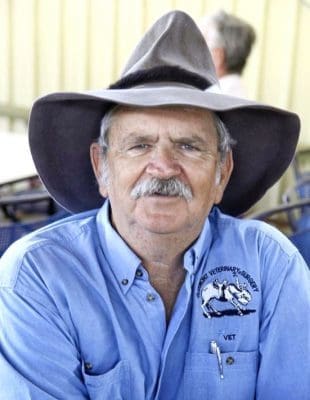Allowing fee-for-service pregnancy-testers to take a key component of the work that underpins the viability of rural Queensland veterinary practices could have serious ramifications for future herd biosecurity, health and productivity in the State, the head of the Australian Cattle Veterinarians Association has warned.
The Queensland Government is taking submissions until tomorrow on proposed changes to State legislation that would allow pregnancy testing of cattle in Queensland by non-veterinarians, as is the practice in Western Australia and the Northern Territory.
Queensland cattle producers through AgForce have argued that being forced to rely on a limited number of veterinarians is restrictive, expensive and impractical and places them at a competitive disadvantage to their counterparts in the NT and WA.
AgForce Cattle President Will Wilson last week said current legislation is outdated. Allowing trained and accredited operators to pregnancy test cattle would encourage more producers to undertake pregnancy testing, which would benefit future herd management, productivity and profitability, he said.
Mr Wilson added that vets already operate in a market alongside an “underground” of laypersons providing pregnancy testing, and there was no evidence this had reduced vets’ business.
However, Australian Cattle Veterinarians Association president Dr Alan Guilfoyle, who operates a large private veterinary practice at Clermont in Central Queensland, said it was hard to imagine how the move would not undermine the sustainability of existing veterinary businesses which currently service remote cattle regions.
As a sparsely populated area surrounded by a large and exposed coastline, northern Queensland was a potential biosecurity nightmare, he said. The valuable role of ‘passive surveillance’ played by professional veterinarians as they visited properties throughout the region should not be discounted, he warned.
“We have got to wake up that we really need that passive surveillance and that important layer of security,” Dr Guilfoyle told Beef Central.
“The only way you are going to get that is if you have practice sustainability. It’s a term I am loathe to use because people say you are only feathering your own nest and trying to make a quid.
“Well, if you want to survive in any industry you have got to make a quid.
“The private sector has to be viable, if you want services it is going to come from the private sector, it has to be viable, it has to be sustainable.”
Dr Guilfoyle is working to educate people on the unseen value that professional veterinarians provide to the industry, and the value of having close working relationships between producers and veterinarians.
He said he agreed with AgForce’ push for more producers to undertake pregnancy testing, but added that there was “nothing in this whole argument from the veterinary profession that would stop producers from learning to do their own cattle in-house”.
“It is when you have quasi-professionals going out and charging fee for service that is the issue.
“When veterinarians go on property we value add, we give a lot of service away, and we are picking up on biosecurity and in-herd health all the time.
“The further you go north the national biosecurity is a major, major issue and having that veterinary presence is very important. It is not just exotic diseases, a vet can walk into a herd and see disease like pesti or reproductive diseases people mightn’t know were there at all.
“There is a lot of value in having a vet on farm.”
Dr Guilfoyle said the value of pregnancy testing could not be underestimated in terms of the benefits that removing empty breeders provided for grass management, herd fertility, productivity and business profitability. One colleague in the Northern Territory had helped a producer reduce the number of breeders from 15,000 to 10,000 through pregnancy testing while still managing to maintain the same level of production.
The ‘Preg Check’ accreditation scheme held veterinarians conducting pregnancy testing to very rigid standards, he said, with the threat of loss of accreditation or sanctions from the Veterinarian Surgeons board if those standards were not met.
Dr Guilfoyle said poor pregnancy testing outcomes can lead to poor animal welfare outcomes at a time when there were more eyes than ever before on welfare standards in the livestock sector.
“For market integrity and certification at point of delivery it must remain in the hands of professionals.”

